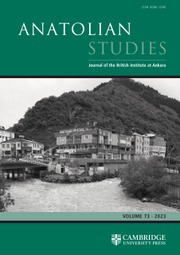Article contents
The collapse of empire at Gordion in the transition from the Achaemenid to the Hellenistic world
Published online by Cambridge University Press: 20 June 2019
Abstract
Gordion, ancient capital of Phrygia, was a large and thriving city of secondary importance during the period of the Achaemenid Persian Empire (ca 550–333 BC). Recent work makes possible a reconsideration of the site: evaluating its architecture, finds and use of landscape within and after the socio-economic and administrative context of the Achaemenid imperial system enables the following new overview. During the Achaemenid period, Gordion’s populace participated in the broad cultural exchanges enabled by the imperial system and may have emphasised animal husbandry. When Alexander’s conquest led to the collapse of the Achaemenid administrative infrastructure, the impact on Gordion’s economy and cultural circumstance was profound. Its population plummeted, the architectural and spatial organisation of the site changed dramatically and new directions and means of trade and cultural interaction developed. Gordion’s archaeological remains reflect and emphasise the tremendous historical and political changes attending the end of the Empire and the beginning of the Hellenistic period.
Özet
Frigya’nın antik başkenti Gordion, Akhaimenid Pers İmparatorluğu döneminde (MÖ. 550–333) ikincil öneme sahip büyük ve gelişen bir şehirdi. Yapılan son çalışmalar bu bölgenin tekrardan değerlendirilmesine imkan vermiştir. Mimari özelliklerinin incelenmesi, bulgular ve arazinin Akhaimenid İmparatorluk sisteminin sosyo-ekonomik ve idari bağlamı süresince ve öncesinde kullanımının gözlenmesi yeni bir genel bakış açısı sağlamıştır. Akhaimenid döneminde Gordion nüfusu, imparatorluk sisteminin sağladığı imkan ile, geniş kültür alışverişinde bulunmuş ve hayvancılığına önem vermiş olabilir. İskender’in fethi ise Akhaimenid idari altyapısının çökmesine ve Gordion ekonomisi ile kültürel durumu üzerinde derin etkiler bırakmasına sebep olmuştur. Gordion’un nüfusu oldukça düşmüş; bölgenin mimari ve mekansal organizasyonu önemli ölçüde değişmiş ve ticaret ile kültürel etkileşim için yeni yollar ve yöntemler ortaya çıkmıştır. Gordion’un arkeolojik kalıntıları, bir imparatorluğun bitişine ve Helenistik dönemin başlangıcına ait süreçten muazzam tarihi ve politik değişimleri yansıtır ve onlara vurgu yapar.
- Type
- Articles
- Information
- Copyright
- © British Institute at Ankara 2019
- 5
- Cited by


